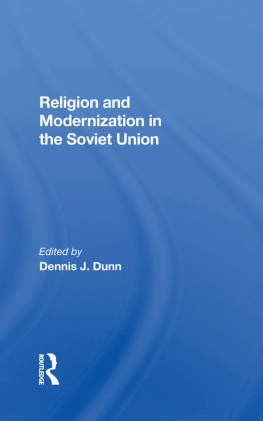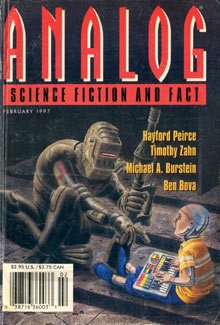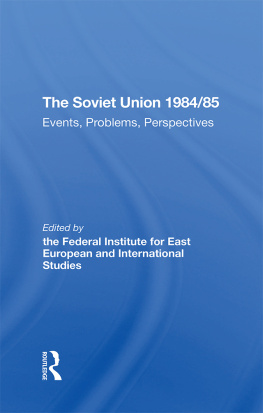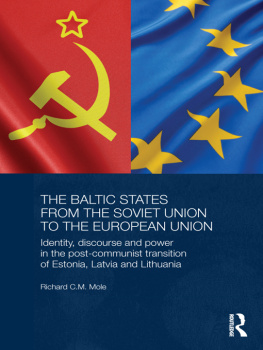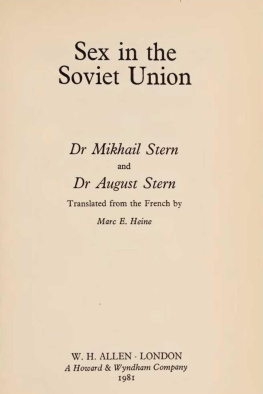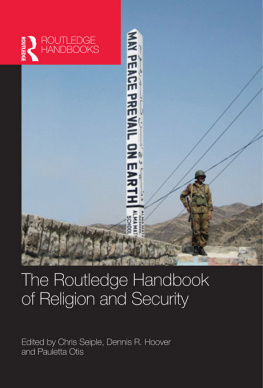Religion and Modernization in the Soviet Union
Westview Replica Editions
This book is a Westview Replica Edition. The concept of Replica Editions is a response to the crisis in academic and informational publishing. Library budgets for books have been severely curtailed; economic pressures on the university presses and the few private publishing companies primarily interested in scholarly manuscripts have severely limited the capacity of the industry to properly serve the academic and research communities. Many manuscripts dealing with important subjects, often representing the highest level of scholarship, are today not economically viable publishing projects. Or, if they are accepted for publication, they are often subject to lead times ranging from one to three years. Scholars are understandably frustrated when they realize that their first-class research cannot be published within a reasonable time frame, if at all.
Westview Replica Editions seem to us one feasible and practical solution to the crisis. The concept is simple. We accept a manuscript in camera-ready form and move it immediately into the production process. The responsibility for textual and copy editing lies with the author or sponsoring organization. If necessary we will advise the author on proper preparation of footnotes and bibliography. The manuscript is acceptable as typed for a thesis or dissertation or prepared in any other clearly organized and readable way, though we prefer it typed according to our specifications. The end result is a book produced by lithography and bound in hard covers. Edition sizes range from 200 to 600 copies. We will include among Westview Replica Editions only works of outstanding scholarly quality or of great informational value and we will exercise our usual editorial standards and quality control.
Religion and Modernization in the Soviet Union edited by Dennis J. Dunn
To the surprise of many students of the Soviet Union, religion has shown itself to be a force still powerful in Soviet society. In contrast, the impact of religion in developed Western societies has declined. Dr. Dunn points out that the study of this antinomy can shed light on the entire concept of "modernization" in the U.S.S.R. The study of the Soviet case can reveal the effect of religions and religious problems on Soviet modernization, and vice versa, and can also provide insight into the question of whether religion and modernization are compatibleor whether the advance of the latter signals the demise of the former.
This pioneering examination of the relationship between religion and modernization in the U.S.S.R. brings together the work of top international specialists in the fields of Soviet religions and intellectual history.
Dennis J. Dunn is associate professor of history and director of the Institute for the Study of Religion and Communism at Southwest Texas State University. He has recently completed The Catholic Church and the Soviet Government, 1939-1949,, to be published this year as part of the East European Monograph Series.
Religion and Modernization in the Soviet Union
edited by
Dennis J. Dunn
First published 1977 by Westview Press, Inc.
Published 2019 by Routledge
52 Vanderbilt Avenue, New York, NY 10017
2 Park Square, Milton Park, Abingdon, Oxon OX14 4RN
Routledge is an imprint of the Taylor & Francis Group, an informa business
Copyright 1977 Taylor & Francis
All rights reserved. No part of this book may be reprinted or reproduced or utilised in any form or by any electronic, mechanical, or other means, now known or hereafter invented, including photocopying and recording, or in any information storage or retrieval system, without permission in writing from the publishers.
Notice:
Product or corporate names may be trademarks or registered trademarks, and are used only for identification and explanation without intent to infringe.
Library of Congress Card Number: 77-86372
ISBN 13: 978-0-367-28557-9 (hbk)
Contents
by Dennis J. Dunn
Dennis J. Dunn
Donald W. Treadgold
Alfred Levin
Walter Sawatsky
Sidney Monas
David E. Powell
William C. Fletcher
Alexandre Bennigsen
Zvi Gitelman
Bohdan R. Bociurkiw
V. Stanley Vardys
Andrew Blane
The idea of this volume was conceived at an international symposium on religion and modernization in the Soviet Union which was organized at Southwest Texas State University in March 1976 by the American Association for the Advancement of Slavic Studies. The contributors to this volume were participants in this symposium. They represent not only an array of disciplines, but also the best scholarship available for analyzing the relationship between religion and modernization in the USSR.
This collection of essays ultimately is a team effort and it stands as a tribute to selfless scholarship and to the commitment of both publisher and researcher to the advance of knowledge. The book was produced via the relatively inexpensive off-set method of publishing and all royalties, small though they may be, will be given to the Research and Development Committee of the American Association for the Advancement of Slavic Studies to fund further conferences delving into unexplored or still puzzling problems of Slavic studies.
The book owes a deep debt of gratitude to the Research and Development Committee of the American Association for the Advancement of Slavic Studies, then chaired by Professor George Hoffman of the University of Texas. Both Professor Hoffman and Professor S. Frederick Starr, also a member of the Committee and the Executive Director of the Kennan Institute for Advanced Russian Studies, Washington, D.C., were of immeasurable help in organizing the conference. Professors Alfred Levin, V. Stanley Vardys, Alexandre Bennigsen, and William C. Fletcher provided many valuable insights and much encouragement at the early stages of this project. Professor Sidney Monas did the same at the end of the undertaking. The idea for the meeting was planted two years before by Bohdan R. Bociurkiw during a visit to San Marcos, Texas. He is to be commended singularly for his leadership in the field of church state relations in the Communist world.
The conference could not have been held or executed as smoothly as it was without the full support and cooperation of Southwest Texas State University. In many ways the hosting of this international gathering marked the emergence of Southwest Texas State University as a center of scholarship in the southwest. A special note of thanks goes to Frederick Praeger and Lynne C. Rienner of Westview Press for their interest and support in bringing the conference papers to print. I extend my appreciation to my wife, Margaret, who provided me with the time so crucial to scholarship. Linda Catoggio did the superb job of typing the final manuscript. Exercising the editor's prerogative, I wish to dedicate this volume to Bohdan R. Bociurkiw, a man of uncommon insights into the problems of religion in the Soviet Union.
San Marcos, Texas
June, 1977
D.J.D.
Chapter 1
Introduction
Dennis J. Dunn and Donald W. Treadgold
The relationship between religion and modernization in the Soviet Union is an overlooked subject. There are multiple books on the problem of Soviet modernization and also on Soviet religions but none on the nexus between them. For many Western observers the term "modernization" conjures up ideas of huge factories, bulging cities, and secularized education, almost anything but religion, churches, and believers. If, per chance, religion does impinge on the image, it usually would be thought of as something like a human appendix, interesting but not of much perceptible value. It has, of course, been recognized with regard to the USSR that religions have suffered a certain oppression, but, notwithstanding such persecution, Western scholars, like Walter Laqueur, still conclude that religion has not been a significant factor in the past fifty years of Soviet history1


